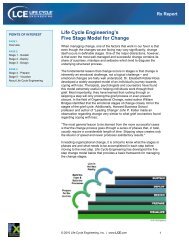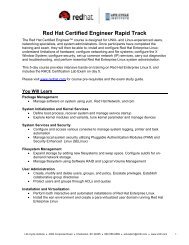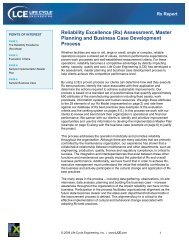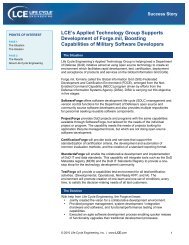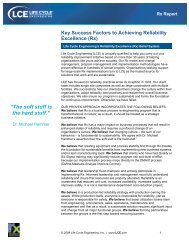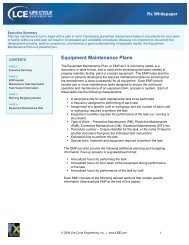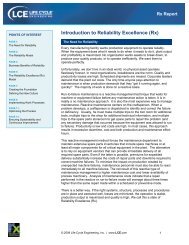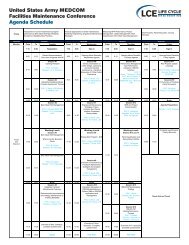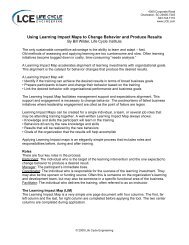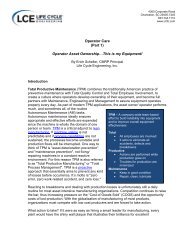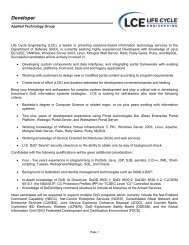Leadership Seminars Brochure (PDF) - Life Cycle Engineering
Leadership Seminars Brochure (PDF) - Life Cycle Engineering
Leadership Seminars Brochure (PDF) - Life Cycle Engineering
Create successful ePaper yourself
Turn your PDF publications into a flip-book with our unique Google optimized e-Paper software.
<strong>Leadership</strong> <strong>Seminars</strong><br />
Truly great leaders possess excellent interpersonal skills, are effective<br />
communicators and have expertise in their area of specialty. For most<br />
managers, however, these skills are not innate; they must be learned.<br />
Each person has his own strengths and shortcomings, which is why the<br />
<strong>Life</strong> <strong>Cycle</strong> Institute offers a variety of seminars for improving leadership<br />
skills. We understand that because individual needs vary, some may<br />
require an in-depth seminar while others are looking for only an overview<br />
of the topic. For this reason the following seminars can be tailored to fit<br />
any time frame and budget from a Lunch and Learn to a full day delivery.<br />
Employee DevelopmenT:<br />
Motivating Employees to be Their Best: Learn strategies for<br />
motivating employees according to your leadership style. Identify<br />
factors that affect motivation both positively and negatively. Encourage<br />
community and openness, teach groups to learn from their mistakes,<br />
encourage groups to take initiative.<br />
The Art of Successful Coaching: Establish a sound performance<br />
improvement system, learn the five approaches to coaching, follow<br />
the four-step preparation process for conducting a coaching session,<br />
implement steps for effective coaching. Enhance team trust, respect<br />
and empowerment. Learn to set meaningful team goals.<br />
Performance Management: Understand the elements of an effective<br />
performance management system. Help employees establish clear,<br />
measurable, attainable performance goals. Provide feedback that will lead<br />
to improvement. Follow a discipline plan for performance problems.<br />
Communication SKILLS:<br />
The Art of Influencing Others: Use communication to build rapport,<br />
develop genuine relationships and resolve conflicts. Learn how to use<br />
both verbal and nonverbal messages to be more influential with others.<br />
Communication Skills for Emerging Leaders: Get familiar with<br />
the strengths and shortcomings of your communication skills. Use this<br />
information to build rapport and communicate more effectively. Prepare<br />
effective and appropriate business documents, establish a protocol for<br />
electronic communication and prevent unnecessary conflict.<br />
How to Develop and Deliver Dynamic Presentations: Enhance<br />
your presentation skills by creating audience appeal, defining objectives<br />
and maintaining the attention and interest of the audience. Determine<br />
how to select the appropriate delivery method. Conduct evaluation to<br />
further improvement.<br />
Planning and Managing Tasks:<br />
Time Management: Understand the relationship between personality<br />
preferences and time management styles. Implement strategies to<br />
overcome procrastination and recognize its causes. Manage to-do lists,<br />
incoming paper and clutter. Apply time-saving techniques, automate tasks<br />
and learn effective ways to prioritize tasks.<br />
Meeting Management: How to prepare for and conduct effective<br />
meetings. Build an effective agenda, begin and end meetings on time,<br />
avoid distractions, solve problems in a group, generate productive<br />
discussions, handle “problem” personalities and increase accountability<br />
for tasks.<br />
Leading Through Change: Identify change and the different<br />
reactions to it. Evaluate the affect change will have on people within<br />
the organization. Recognize change resistance and the eight mistakes<br />
companies make during change. Develop change strategies, a change<br />
communication plan and align systems and structure to change.<br />
Team Dynamics:<br />
Managing Teams: Determine fundamentals for establishing a<br />
team, team roles, personality types and leadership responsibilities.<br />
Hold effective meetings, lead through coaching and enhance decisionmaking.<br />
Learn to appropriately handle conflict and communication<br />
issues. Establish metrics for measuring team success and aptly<br />
reward accomplishments.<br />
Conflict Management: Understand the two basic types of conflict,<br />
four typical approaches to conflict and steps to conflict resolution.<br />
Employ strategies for dealing with challenging people and learn to<br />
handle specific situations with tact.<br />
Self-Awareness:<br />
Increasing Your Emotional Intelligence: Understand the<br />
consequences of unmanaged emotions. Increase your empathy and<br />
social skills and practice techniques to achieve greater self-awareness,<br />
self-control and self-motivation. Recognize how emotional intelligence<br />
can enhance employee relationships and increase production.<br />
Adapting Your Style: Learn to be an effective leader by influencing<br />
others, recognizing style differences in others and providing feedback<br />
to different style types. Facilitate effective meetings and motivate<br />
employees according to their individual needs.<br />
High impact learning that produces results



